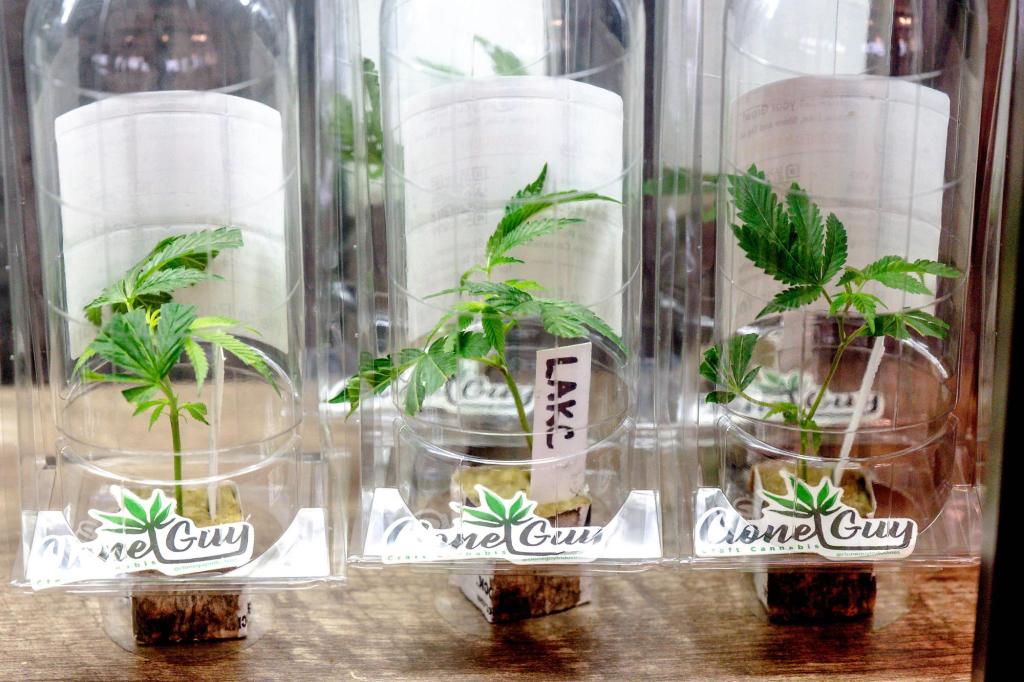Two and a half centuries after the Boston Tea Party, legal cannabis operators say it might be time for a California Weed Party.
But rather than dump their agricultural product into the Pacific Ocean, shop owners and others are floating the idea of withholding their state tax payments. This year, that could add up to $1.3 billion.
The goal is to express frustration with the state of the industry in California, where legal cannabis merchants struggle to compete with illicit operators who have a huge price advantage specifically because they don’t follow the rules.
This dynamic has been true for five years, since state voters chose to regulate and tax cannabis. And legal operators say they need it to change.
“This is the response you get when you feel like you’re being taxed and you don’t have representation,” said Jerred Kiloh, who owns a licensed cannabis store in Los Angeles and serves as president of the United Cannabis Business Association trade group.
“That’s really how it feels right now in cannabis. Everyone is taking the money and no one is doing anything to protect our industry.”
The strong reaction from industry insiders comes in response to news that California is raising cultivation taxes on legal cannabis some 4.5% starting Jan. 1, even as the state is facing an estimated $31 billion budget surplus in 2022.
No industry likes tax increases, so it would be easy to dismiss complaints over the latest hike. But no industry (aside from tobacco) is taxed at rates faced by the cannabis industry, with licensed marijuana businesses also facing bans by most local cities and unique competition from an entrenched underground market.
All Californians have a stake in curtailing the illicit marijuana market. Unlike the regulated sector, underground cultivators, manufacturers and sellers are still regularly linked to serious crimes, fire dangers, environmental hazards and health risks for consumers.
But operators who’ve been struggling to make money since joining the regulated market say they’re reaching a breaking point. Anecdotally, some talk about operators leaving California, or simply resuming life as unlicensed merchants.
And some are toying with the dramatic idea of withholding tax payments.
“I’ve been in the industry for 20 years,” said Kiloh, who worked in the medical cannabis space before Californians legalized recreational sales in 2016.
“This is the worst it’s ever been.”
High taxes, little help
Since voters opted to regulate cannabis in 2016, all products legally sold in California have come with a 15 percent excise tax. Cultivators also pay a tax based on the weight of what they sell, which in turn bumps up the retail price. Then there’s regular state sales tax, which typically runs between 8 and 10 percent. Plus, cities and counties that allow marijuana businesses typically tack on local cannabis taxes, which can reach as high as 15%.
It all adds up to an effective tax rate for California cannabis businesses that can easily top 45%.
The state’s take from that tax revenue has been going up. In 2020, California collected $1.1 billion from cannabis companies, and this year the industry is on pace to pay $1.3 billion.
But, to date, the high tax rate — and the revenues collected — have done little to level the playing field. California’s underground cannabis business is estimated to be twice as big as the legal side of the industry.
And the legal operators suffer because the costs of following the rules inevitably get passed along to consumers, exacerbating the price gap between legal and illegal cannabis. Products sold from underground shops and hustlers with backpacks often cost half as much as the products sold in Kiloh’s licensed L.A. store, he grudgingly acknowledges.
Surveys show most cannabis consumers want to buy regulated, legally produced products, which must be grown without harmful chemicals that poison waterways and are tested for safety. But the same research also shows that buyers will only absorb price differences of around 10% before accepting the risks that come with unregulated products.
The hefty taxes also mean that some cannabis business are turning little to no profit, even as their overall sales volumes go up.
That daunting outlook might be why the legal side of the industry is shrinking. In 2018, there were roughly 16,000 licenses for cannabis businesses in California, a figure that by 2020 had fallen to about 10,000 licenses, according to an analysis earlier this year by the Legislative Analyst’s Office.
Some of those operators surely left the state or industry entirely. But Kiloh said he personally knows many who simply returned to an unregulated industry that’s thrived since Californians became the first in the nation to loosely legalize medical marijuana in 1996.
Meanwhile, cannabis tax revenue is not used to combat illicit competition.
Per a formula laid out in Prop. 64, the money generated by cannabis is used by the state to fund research on the effects of legalization, programs for at-risk youth, development of roadside protocols to determine marijuana impairment, drug use prevention and treatment, and environmental restoration. Local jurisdictions that allow cannabis businesses can apply for a share of limited grant money, which they can use to help fund law enforcement activities. But that doesn’t help legal operators who might be a block away from unlicensed shops in neighboring cities.
California also has budgeted to take in $146 million this fiscal year in licensing, regulatory and penalty fees from cannabis business. Those funds pay to run the Department of Cannabis Control, which has investigators who work with law enforcement to target illicit operators. The agency regularly announces raids on unlicensed businesses, as does the state Attorney General.
But, with weak penalties in California for most cannabis crimes, many of these underground operators simply pop up again, perpetuating a game of whack-a-mole that regulators and sellers have played for 25 years.
Even within the world of licensed operators, support for a crackdown on the illicit market is not unanimous. Many licensed operators started on the illegal side of the industry and still have friends who haven’t made the transition.
Instead, legal operators argue that lowering taxes and other other barriers to entry is the best way to bring more people to the regulated side of the market, and that those changes would lead to fair competition.
No champion
Cannabis taxes were approved by voters, so lowering them requires either a two-thirds vote in the state legislature or a ballot initiative. So far, both options have fallen flat.
When he was an Assemblyman from Alameda, state Attorney General Rob Bonta floated bills that would have temporarily lowered the cannabis excise tax rate and suspended the cultivation tax, arguing the moves would boost state revenue in the long-run by drawing more businesses and shoppers into the regulated market. But none of Bonta’s bills got any traction, and he’s left the legislature to become state Attorney General.
Kiloh said the cannabis industry doesn’t feel like it has any champions left in Sacramento. Republicans who typically support lowering taxes aren’t anxious to stick their necks out for the marijuana industry, he said. And Democrats, he argued, are reluctant to cut taxes that fund other programs they believe in.
“Everything we need to do in cannabis is a by two-thirds vote. How do you get two thirds of anyone to agree on tax reduction?”
The cannabis industry hoped it would have an ally in Gov. Gavin Newsom, who campaigned for Prop. 64 when he was Lieutenant Governor. But so far, Newsom hasn’t said much about the persistence of the illegal market and how it might be tied to cannabis taxes.
A spokesman for Newsom’s press office said Friday that the governor supports “cannabis tax reform, which would require additional partnership from the Legislature.” The spokesman added that the state has allocated hundreds of millions of dollars to licensing and enforcement, and has established the Department of Cannabis Control.
That department’s director, Nicole Elliott, said she also supports reducing barriers to entry, including financial barriers.
Still, to date, neither leader has come out publicly calling for lower taxes. Cannabis operators also haven’t seen recommendations to slash taxes in reports from the Legislative Analyst’s office. Likewise, they see no push for lower taxes from university researchers, some of whom receive tax revenue to study, among other things, the effectiveness of California’s cannabis tax scheme. Even the California Cannabis Advisory Committee, created under Prop. 64 to analyze and make recommendations on how regulated cannabis is playing out in California, has yet to call for lower taxes.
Instead, cannabis groups have seen smaller wins by asking local governments to lower or temporarily suspend their cannabis taxes.
In San Francisco, for example, supervisors said on Tuesday, Nov. 30, that they would push back a 1% to 5% cannabis tax that was supposed to kick in Jan. 1. They’re also suspending all cannabis taxes through the end of 2022 to help legal retailers better compete with illicit sellers.
Tax hike imminent
The cannabis industry is facing another state tax hike in four weeks.
Prop. 64 instructs the California Dept. of Taxation and Fee Administration to adjust marijuana tax rates each year as needed to keep up with inflation.
Regulators last increased cannabis taxes on Jan. 1, 2020, bumping up the markup rate — or the rate retailers must charge above wholesale prices — by 20% and increasing cultivation taxes by 4%. The agency planned to raise taxes again at the start of 2021, but state lawmakers passed emergency legislation to delay the increase due to the coronavirus pandemic.
Now the agency plans to increase cultivation taxes 4.5% at the start of 2022. The markup rate will hold through at least June.
Farmers are expected to pay more than $166 million in cultivation taxes this year. An extra 4.5% means they’ll pay another $7.5 million in 2022.
This is happening even as oversupply is causing cannabis prices to crater in California.
There are 8,458 active cultivation licenses in the state and 835 licensed shops, with retail cannabis sales only allowed in roughly a third of California cities. As a result, an analysis by MJBizDaily.com shows wholesale prices for cannabis flower grown outdoors have plummeted 60% in the past year.
But, under the state’s current interpretation of Prop. 64, the tax hike scheduled for Jan. 1 is non-negotiable. It’s based on overall inflation in the economy, and in recent months prices for everything from cars to gasoline has shot up.
Retailer Kiloh said he doesn’t fault the state agency for doing its job. But some industry advocates do have a suggestion: Instead of pegging cannabis tax hikes to overall inflation, why not set the new rate to changes within the industry?
Hilary Bricken, a cannabis industry attorney in Los Angeles, suggested it’s possible, noting that the standard of inflation, and even the word “inflation,” is not defined in Prop. 64.
But it would be a long and pricey legal battle to get a judge to try to change the state’s interpretation of Prop. 64. And, so far, no one has taken up that fight.
Fighting back
The idea of a tax revolt by California’s cannabis industry, on the other hand, has been building for some time.
Two years ago, Kiloh said he talked with others in his industry about staging a “California Weed Party,” where they’d all put their tax money into an escrow account instead of handing it over to the state. He said he was told at the time that was “too drastic.”
But as the Sacramento Bee first reported, Michael Steinmetz, who heads up the company that makes Flow Kana cannabis brand products, published an op-ed on Medium on Nov. 22 saying he’s recommending his board do just that with its cultivation taxes after July 1.
“Our recommendation will be to place our estimated tax in escrow in good faith, and to withhold payment until we see real, actionable change,” Steinmetz wrote. “We invite our fellow California operators to join us.”
Attorney Bricken said she wouldn’t recommend clients refuse to pay their taxes. Such a move, she said, would “violate all kinds of tax laws and regulations” and could lead to their licenses getting suspended by the state.
But Kiloh said he fears California in on the verge of losing its decades-long legacy as the top producer of the world’s best cannabis. He believes many more legacy farmers will be out of work by the end of 2022.
The industry, he said, is getting desperate.
“We’re just looking for some pathway to success.”










